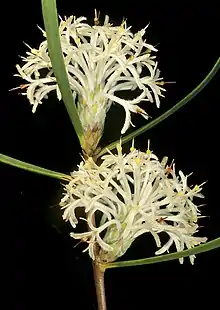| Petrophile heterophylla | |
|---|---|
 | |
| Scientific classification | |
| Kingdom: | Plantae |
| Clade: | Tracheophytes |
| Clade: | Angiosperms |
| Clade: | Eudicots |
| Order: | Proteales |
| Family: | Proteaceae |
| Genus: | Petrophile |
| Species: | P. heterophylla |
| Binomial name | |
| Petrophile heterophylla | |
| Synonyms[1] | |
|
List
| |
Petrophile heterophylla, commonly known as the variable-leaved conebush,[2] is a species of flowering plant in the family Proteaceae and is endemic to southwestern Western Australia. It is a shrub with variably shaped, sometimes pinnately-divided leaves, and oval heads of silky-hairy, yellow to cream-coloured flowers.
Description
Petrophile heterophylla is a spindly, non-lignotuberous shrub that typically grows to a height of 0.5–2 m (1 ft 8 in – 6 ft 7 in) and has glabrous branchlets and leaves. The leaves are more or less flattened, mostly about 140 mm (5.5 in) long and 2–6 mm (0.079–0.236 in) wide, linear to lance-shaped with a sharply-pointed tip, but sometimes pinnately-divided or lobed. The flowers are mostly arranged in leaf axils, sometimes on the ends of branchlets in sessile, oval heads 6–8 mm (0.24–0.31 in) long, with many overlapping involucral bracts at the base. The flowers are 10–15 mm (0.39–0.59 in) long, yellow to cream-coloured and silky-hairy. Flowering occurs from August to October and the fruit is a nut, fused with others in an oval to oblong head about 12 mm (0.47 in) in diameter.[3][2]
Taxonomy
Petrophile heterophylla was first formally described in 1840 by John Lindley in A Sketch of the Vegetation of the Swan River Colony.[4][5] The specific epithet (heterophylla) means "different-leaved".[6]
Distribution and habitat
This petrophile grows in low heath, dense scrub, open woodland and forest in the Stirling Range, east to an area between Ravensthorpe and Esperance and north to near Chittering, in the southwest of Western Australia.[3][2]
Conservation status
Petrophile heterophylla is classified as "not threatened" by the Government of Western Australia Department of Parks and Wildlife.[2]
References
- 1 2 "Petrophile heterophylla". Australian Plant Census. Retrieved 13 December 2020.
- 1 2 3 4 "Petrophile heterophylla". FloraBase. Western Australian Government Department of Biodiversity, Conservation and Attractions.
- 1 2 Foreman, David B. "Petrophile heterophylla". Australian Biological Resources Study, Department of Agriculture, Water and the Environment: Canberra. Retrieved 13 December 2020.
- ↑ "Petrophile heterophylla". APNI. Retrieved 13 December 2020.
- ↑ Lindley, John (1840). A Sketch of the Vegetation of the Swan River Colony. London: James Ridgway. p. xxxv. Retrieved 13 December 2020.
- ↑ Sharr, Francis Aubi; George, Alex (2019). Western Australian Plant Names and Their Meanings (3rd ed.). Kardinya, WA: Four Gables Press. p. 216. ISBN 9780958034180.